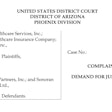
The U.S. Department of Health and Human Services (HHS) is proposing rule changes to the current physician self-referral law and the federal antikickback statute.
The proposed revisions to the Stark law and kickback prohibitions are part of HHS' Regulatory Sprint to Coordinated Care initiative. The aim of the revisions is to help clarify regulations for healthcare providers participating in value-based arrangements and providing coordinated care for patients. The changes are intended to lessen the compliance burden for providers while maintaining safeguards to protect patients and programs from fraud and abuse, the department said.
"These proposed rules would be a historic reform of how healthcare is regulated in America," said Eric Hargan, HHS deputy secretary, in a statement. "They are part of a much broader effort to update, reform, and cut back our regulations to allow innovation toward a more affordable, higher quality, value-based healthcare system, while maintaining the important protections patients need."
The proposed revisions to the Stark law acknowledge that incentives are different in a healthcare system that pays for the value of services provided, rather than the volume, according to the HHS. The changes would ensure that the Stark law will continue to protection against overutilization and other challenges, while giving physicians and other healthcare providers more flexibility to improve the quality of care.
Finally, the proposed changes to the antikickback regulations are designed to address concerns that these laws unnecessarily limit the ways in which healthcare providers can coordinate patient care, the department said. The changes would promote beneficial innovation and improve coordinated care through a variety of avenues, such as outcome-based payments that reward improvements in patient health.



















